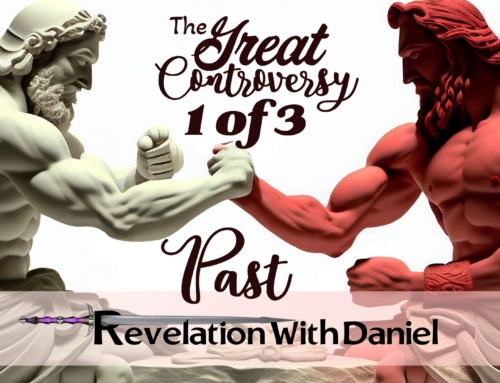 Gideon had just seen the “angel of the LORD…”
Gideon had just seen the “angel of the LORD…”
Judg. 6:25 And it came to pass the same night, that the LORD said unto him, Take thy father’s young bullock, even the second bullock of seven years old, and throw down the altar of Baal that thy father hath, and cut down the grove that is by it:
Judg. 6:26 And build an altar unto the LORD thy God upon the top of this rock, in the ordered place, and take the second bullock, and offer a burnt sacrifice with the wood of the grove which thou shalt cut down.
(Jamieson-Fausset-Brown Bible Commentary)
Judg. 6:25: “Take thy father’s … second bullock—The Midianites had probably reduced the family herd; or, as Gideon’s father was addicted to idolatry, the best may have been fattened for the service of Baal; so that the second was the only remaining one fit for sacrifice to God.”
Judg. 6:27 Then Gideon took ten men of his servants, and did as the LORD had said unto him: and so it was, because he feared his father’s household, and the men of the city, that he could not do it by day, that he did it by night.
Judg. 6:28 And when the men of the city arose early in the morning, behold, the altar of Baal was cast down, and the grove was cut down that was by it, and the second bullock was offered upon the altar that was built.
Judg. 6:29 And they said one to another, Who hath done this thing? And when they enquired and asked, they said, Gideon the son of Joash hath done this thing.
Judg. 6:30 Then the men of the city said unto Joash, Bring out thy son, that he may die: because he hath cast down the altar of Baal, and because he hath cut down the grove that was by it.
Judg. 6:31 And Joash said unto all that stood against him, Will ye plead for Baal? will ye save him? he that will plead for him, let him be put to death whilst it is yet morning: if he be a god, let him plead for himself, because one hath cast down his altar.
Judg. 6:32 Therefore on that day he called him Jerubbaal, saying, Let Baal plead against him, because he hath thrown down his altar.
Jerubbaal (14x) H3378 (14x)
[Hebrew Strong’s]
3378. יְרֻבַּעַל Yrubbaʿal, yer-oob-bah´-al; from 7378 and 1168; Baal will contend; Jerubbaal, a symbol. name of Gideon:—Jerubbaal.
[Easton Bible Dictionary]
Jerubbaal: contender with Baal; or, let Baal plead, a surname of Gideon; a name given to him because he destroyed the altar of Baal (Judg. 6:32; 7:1; 8:29; 1 Sam. 12:11).
Judg. 8:30 And Gideon had threescore and ten sons of his body begotten: for he had many wives.
Judg. 7:1 Then Jerubbaal [contender with Baal], who is Gideon [feller, warrior], and all the people that were with him, rose up early, and pitched beside the well of Harod: so that the host of the Midianites were on the north side of them, by the hill of Moreh, in the valley.
Judg. 7:2 And the LORD said unto Gideon, The people that are with thee are too many for me to give the Midianites into their hands, lest Israel vaunt themselves against me, saying, Mine own hand hath saved me.
Judg. 7:3 Now therefore go to, proclaim in the ears of the people, saying, Whosoever is fearful and afraid, let him return and depart early from mount Gilead. And there returned of the people twenty and two thousand; and there remained ten thousand.
Deut. 20:5 And the officers shall speak unto the people, saying, What man is there that hath built a new house, and hath not dedicated it? let him go and return to his house, lest he die in the battle, and another man dedicate it.
Deut. 20:6 And what man is he that hath planted a vineyard, and hath not yet eaten of it? let him also go and return unto his house, lest he die in the battle, and another man eat of it.
Deut. 20:7 And what man is there that hath betrothed a wife, and hath not taken her? let him go and return unto his house, lest he die in the battle, and another man take her.
Deut. 20:8 And the officers shall speak further unto the people, and they shall say, What man is there that is fearful and fainthearted? let him go and return unto his house, lest his brethren’s heart faint as well as his heart.
Those who were unwilling to face danger and hardships, or whose worldly interests would draw their hearts from the work of God, would add no strength to the armies of Israel. Their presence would prove only a cause of weakness. PP 548.3
It had been made a law in Israel that before they went to battle the following proclamation should be made throughout the army… (Deuteronomy 20 above)
Because his numbers were so few compared with those of the enemy, Gideon had refrained from making the usual proclamation. He was filled with astonishment at the declaration that his army was too large. But the Lord saw the pride and unbelief existing in the hearts of His people. Aroused by the stirring appeals of Gideon, they had readily enlisted; but many were filled with fear when they saw the multitudes of the Midianites. Yet, had Israel triumphed, those very ones would have taken the glory to themselves instead of ascribing the victory to God. PP 548.4-PP 549.1
Judg. 7:4 And the LORD said unto Gideon, The people are yet too many; bring them down unto the water, and I will try them for thee there: and it shall be, that of whom I say unto thee, This shall go with thee, the same shall go with thee; and of whomsoever I say unto thee, This shall not go with thee, the same shall not go.
Judg. 7:5 So he brought down the people unto the water: and the LORD said unto Gideon, Every one that lappeth of the water with his tongue, as a dog lappeth, him shalt thou set by himself; likewise every one that boweth down upon his knees to drink.
Judg. 7:6 And the number of them that lapped, putting their hand to their mouth, were three hundred men: but all the rest of the people bowed down upon their knees to drink water.
The people were led down to the waterside, expecting to make an immediate advance upon the enemy. A few hastily took a little water in the hand and sucked it up as they went on; but nearly all bowed upon their knees, and leisurely drank from the surface of the stream. Those who took of the water in their hands were but three hundred out of ten thousand; yet these were selected; all the rest were permitted to return to their homes. PP 549.2
Judg. 7:7 And the LORD said unto Gideon, By the three hundred men that lapped will I save you, and deliver the Midianites into thine hand: and let all the other people go every man unto his place.
By the simplest means character is often tested. Those who in time of peril were intent upon supplying their own wants were not the men to be trusted in an emergency. The Lord has no place in His work for the indolent and self-indulgent. The men of His choice were the few who would not permit their own wants to delay them in the discharge of duty. The three hundred chosen men not only possessed courage and self-control, but they were men of faith. They had not defiled themselves with idolatry. God could direct them, and through them He could work deliverance for Israel. Success does not depend upon numbers. God can deliver by few as well as by many. He is honored not so much by the great numbers as by the character of those who serve Him. PP 549.3
Judg. 7:8 So the people took victuals in their hand, and their trumpets: and he sent all the rest of Israel every man unto his tent, and retained those three hundred men: and the host of Midian was beneath him in the valley.
Judg. 7:9 And it came to pass the same night, that the LORD said unto him, Arise, get thee down unto the host; for I have delivered it into thine hand.
Judg. 7:10 But if thou fear to go down, go thou with Phurah thy servant down to the host:
Judg. 7:11 And thou shalt hear what they say; and afterward shall thine hands be strengthened to go down unto the host. Then went he down with Phurah his servant unto the outside of the armed men that were in the host.
Judg. 7:12 And the Midianites and the Amalekites and all the children of the east lay along in the valley like grasshoppers for multitude; and their camels were without number, as the sand by the sea side for multitude.
Judg. 7:13 And when Gideon was come, behold, there was a man that told a dream unto his fellow, and said, Behold, I dreamed a dream, and, lo, a cake of barley bread tumbled into the host of Midian, and came unto a tent, and smote it that it fell, and overturned it, that the tent lay along.
Judg. 7:14 And his fellow answered and said, This is nothing else save the sword of Gideon the son of Joash, a man of Israel: for into his hand hath God delivered Midian, and all the host.
Judg. 7:15 And it was so, when Gideon heard the telling of the dream, and the interpretation thereof, that he worshipped, and returned into the host of Israel, and said, Arise; for the LORD hath delivered into your hand the host of Midian.
Judg. 7:16 And he divided the three hundred men into three companies, and he put a trumpet in every man’s hand, with empty pitchers, and lamps within the pitchers.
Judg. 7:17 And he said unto them, Look on me, and do likewise: and, behold, when I come to the outside of the camp, it shall be that, as I do, so shall ye do.
Judg. 7:18 When I blow with a trumpet, I and all that are with me, then blow ye the trumpets also on every side of all the camp, and say, The sword of the LORD, and of Gideon.
Judg. 7:19 So Gideon, and the hundred men that were with him, came unto the outside of the camp in the beginning of the middle watch; and they had but newly set the watch: and they blew the trumpets, and brake the pitchers that were in their hands.
Judg. 7:20 And the three companies blew the trumpets, and brake the pitchers, and held the lamps in their left hands, and the trumpets in their right hands to blow withal: and they cried, The sword of the LORD, and of Gideon.
The sleeping army was suddenly aroused. Upon every side was seen the light of the flaming torches. In every direction was heard the sound of trumpets, with the cry of the assailants. Believing themselves at the mercy of an overwhelming force, the Midianites were panic-stricken. PP 550.3
Judg. 7:21 And they stood every man in his place round about the camp: and all the host ran, and cried, and fled.
Judg. 7:22 And the three hundred blew the trumpets, and the LORD set every man’s sword against his fellow, even throughout all the host: and the host fled to Bethshittah in Zererath, and to the border of Abelmeholah, unto Tabbath.
Judg. 7:23 And the men of Israel gathered themselves together out of Naphtali, and out of Asher, and out of all Manasseh, and pursued after the Midianites.
Judg. 7:24 And Gideon sent messengers throughout all mount Ephraim, saying, Come down against the Midianites, and take before them the waters unto Bethbarah and Jordan. Then all the men of Ephraim gathered themselves together, and took the waters unto Bethbarah and Jordan.
Judg. 7:25 And they took two princes of the Midianites, Oreb and Zeeb; and they slew Oreb upon the rock Oreb, and Zeeb they slew at the winepress of Zeeb, and pursued Midian, and brought the heads of Oreb and Zeeb to Gideon on the other side Jordan.
In this signal defeat not less than one hundred and twenty thousand of the invaders perished. The power of the Midianites was broken, so that they were never again able to make war upon Israel. The tidings spread swiftly far and wide, that Israel’s God had again fought for His people. No words can describe the terror of the surrounding nations when they learned what simple means had prevailed against the power of a bold, warlike people. PP 553.1
The leader whom God chose to overthrow the Midianites occupied no prominent position in Israel. He was not a ruler, a priest, or a Levite. He thought himself the least in his father’s house. But God saw in him a man of courage and integrity. He was distrustful of himself and willing to follow the guidance of the Lord. God does not always choose for His work men of the greatest talents, but He selects those whom He can best use. “Before honor is humility.” Proverbs 15:33. The Lord can work most effectually through those who are most sensible of their own insufficiency, and who will rely upon Him as their leader and source of strength. He will make them strong by uniting their weakness to His might, and wise by connecting their ignorance with His wisdom.
If they would cherish true humility, the Lord could do much more for His people; but there are few who can be trusted with any large measure of responsibility or success without becoming self-confident and forgetful of their dependence upon God. This is why, in choosing the instruments for His work, the Lord passes by those whom the world honors as great, talented, and brilliant. They are too often proud and self-sufficient. They feel competent to act without counsel from God. PP 553.1-PP 553.3
The simple act of blowing a blast upon the trumpet by the army of Joshua around Jericho, and by Gideon’s little band about the hosts of Midian, was made effectual, through the power of God, to overthrow the might of His enemies. The most complete system that men have ever devised, apart from the power and wisdom of God, will prove a failure, while the most unpromising methods will succeed when divinely appointed and entered upon with humility and faith. Trust in God and obedience to His will are as essential to the Christian in the spiritual warfare as to Gideon and Joshua in their battles with the Canaanites. By the repeated manifestations of His power in behalf of Israel, God would lead them to have faith in Him—with confidence to seek His help in every emergency. He is just as willing to work with the efforts of His people now and to accomplish great things through weak instrumentalities. All heaven awaits our demand upon its wisdom and strength. God is “able to do exceeding abundantly above all that we ask or think.” Ephesians 3:20. PP 554.1
…the men of Ephraim followed up the battle, and helped complete the victory. Nevertheless, they were jealous and angry, as though Gideon had been led by his own will and judgment. They did not discern God’s hand in the triumph of Israel, they did not appreciate His power and mercy in their deliverance; and this very fact showed them unworthy to be chosen as His special instruments. PP 554.2
The spirit of jealousy might easily have been fanned into a quarrel that would have caused strife and bloodshed; but Gideon’s modest answer soothed the anger of the men of Ephraim, and they returned in peace to their homes. Firm and uncompromising where principle was concerned, and in war a “mighty man of valor,” Gideon displayed also a spirit of courtesy that is rarely witnessed. PP 555.3







Leave A Comment